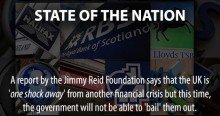A report by the Jimmy Reid Foundation has laid bare the dangers that the UK’s economy face six years after the Credit Crunch. Policy-makers have ignored opportunities to reform but their lack of activity means that we are just ‘one shock away’ from another financial crisis that the UK will not be able to solve.
The Credit Crunch of 2008 should have been the wakeup call for policy makers, telling them that real economic and fiscal reform was needed to prevent another crash in the out-of-control financial sector. Sadly, this opportunity has been ignored by Westminster policy makers, leaving the UK vulnerable to another financial crisis. Only this time, the UK will not be able to ‘bail out’ the banks.
In 2008 the UK’s financial sector was, in proportional terms, the largest financial sector in the world. Prior to the credit crunch the size of financial sector was 16 times the UK’s GDP. It has barely shrunk in the six years since, with it being 14 times the size of the UK’s GDP.
Policy makers have failed to grasp the opportunity to reform the financial sector and this is having far reaching economic ramifications both in the financial sector and other sectors such as:
- Quantitative Easing and low interest has propped up asset prices but have created an asset bubble which has exploded in an unprecedented bubble in UK Government bonds.
- The potential liabilities with financial derivatives within the UK’s financial sector is 400% of the UK’s GDP.
- We have seen a renewed housing bubble, which is growing at 10% per annum.
- We have low productivity in non-financial corporate sector.
- Over 100,000 ‘zombie’ companies – companies that cannot fully service their debt.
- The UK’s public sector debt is twice the level of 2008 and the UK’s decided is at an unprecedented 3.4%.
All this means that the UK’s economy would not be able to ‘bail out’ the financial sector should there be another crash. The fundamental issues that led to the credit crunch have not been addressed and we have a Government bond bubble that is a huge risk to our economy.
This view has been backed up by Andy Haldane, Director of financial stability at the Bank of England, who identified the unstable asset bubble blown up by quantitative easing, particularly in government bonds, as the biggest threat to global financial stability when he gave evidence to the Treasury Select Committee in June 2013.
“If I were to single out what for me would be the biggest risk to global financial stability just now it would be a disorderly reversion in the yields of government bonds globally….Let’s be clear, we have intentionally blown up the biggest bond bubble in history.”
Andy Haldane, Director of financial stability at the Bank of England
Jim Cuthbert, the report’s author, explains that any shocks which lead to a sharp fall in bond or asset prices could lead to a downward spiral of credit contraction and further asset price falls – with disastrous consequences for the real economy.
And there are any number of potential triggers which could provide such a shock: for example:
- A misjudged attempt to reverse quantitative easing.
- A fall in the price of government bonds if investors rediscovered a more normal appetite for risk, and were no longer willing to hold government bonds at very low rates of return as a safe haven.
- A recovery in the US economy, prompting a rise in interest rates there, and requiring the UK to raise interest rates as well to prevent an outflow of capital.
- A shock to some specific class of assets: e.g., a widespread default on Chinese securities, or on European bonds.
- The bursting of the domestic housing or commercial real estate bubbles.
- Adverse political events internationally: e.g., a worsening of the crises in Ukraine or the Middle East.
- Domestic political events such as a domestic UK referendum on EU membership.
The political rhetoric that the banks were too big to fail is too simplistic – in fact, we have a financial sector that is too big and too interconnected to fail. The financial sector dominates the UK’s economy. The measures taken immediately after the credit crunch of 2008 may have prevented systematic collapse but the medicine was poisonous to our unreformed financial sector.
The report ends with a warning that the dangers of another ‘shock’ are ‘large’ and there is a ‘serious risk’ of another crash in the financial sector in ‘the near future’.
The political class and policy makers must realise that the time for fundamental reform is now. We can not wait any longer.







